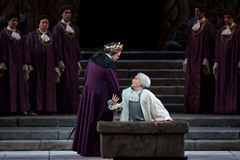| Opera Reviews | 20 April 2024 |
Mozartís first masterpiece returns to the Metby Arlene Judith Klotzko |
|
| Mozart: Idomeneo Metropolitan Opera 21 March 2017 |
|
|
It’s a lovely production, both majestic and refined. This revival is ably directed by David Kneuss. The staging features the 18th century idea of classical ruins: Massive columns, rather the worse for wear, frame the stage; scene changes are managed with scrims featuring architectural drawings in the style of Piranesi. The dominant and formidable stage image is a bas-relief of Neptune, the god who drives the action, with particular attention to his gaping mouth, out of which issue members of the chorus. The effects are quite striking. The singers are superb. Matthew Polenzani exhibits the gravitas befitting a great ruler as he crafts a convincing, deeply human and humane portrayal of the conflict between paternal love and public duty. “Fuor del mar” beautifully embodies the tragic nature of his character’s conflict. Alice Coote is a fine Idamante, ardent in his love for Ilia, and heartbreaking in his love for and grief over the father who rejects him. Coote’s rendition of “Padre mio caro padre” is deeply moving. Elza van den Heever is a superbly disturbed – and at the end of act three – demented Elletra. Her physical and psychological collapse into madness, accompanied by hissing violins, is a sight to behold. Nadine Sierra as Ilia, is convincing as a vulnerable girl in love. She sings with lyricism and aching tenderness. She has a lovely and committed stage presence. Her act two aria, “Se il padre perdei,” with solo flute, is exquisite. Alan Opie as Arbace has perhaps the most conventional role – pretty much right out of opera seria – acquits himself well and sings with dignity and conviction. Finally, an aside: In contrast with Verdi, whose frequent portrayals of love between fathers and their daughters are widely viewed as related to his loss of his own children, Mozart’s life experience and concerns generally do not inform his works. Idomeneo may be an exception. It is an opera about the relationship between Idomeneo and his son. About their love, their estrangement, and the deep grief of Idamante resulting from that estrangement. And it is about longed for and finally actualized reconciliation. The opera is suffused with love and longing. Idamante’s accompanied recitative in act one, “Il padre adorato”, speaks of his bewildered sadness as his father spurns him. The years immediately before he wrote Idomeneo were a time of psychological turmoil and deep grief for Mozart. He was alone in Paris with his mother when she died. He had never been alone before. Her death precipitated a breach with the father who had guided him and subsumed his own life to cultivate the talents of his son. That breach never completely healed. Constanze, reminiscing about her husband after his death, recalled the time that she, Mozart, her sister, and Leopold sang the quartet from the third act of Idomeneo – sang of the suffering and grief that life can bring. After they finished singing, she said, her husband was inconsolable.
|
|
| Text ©
Arlene Judith Klotzko Photos © Marty Sohl / Metropolitan Opera |

 Idomeneo, said to be Mozart’s favorite among his operas, premiered in Munich on January 29, 1781, two days after this twenty-fifth birthday. Its degree of musical creativity, innovation, and dramatic truth was unprecedented. It is an astonishingly innovative work. No opera of his or anyone’s had such a rich and varied color palette or such daringly chromatic harmonies. No other composer had made such use of the accompanied recitative to delineate fully rounded, psychologically complex characters. And features of Mozart’s mature operas are already in evidence, for example, his use of one or two wind instruments in a duet with the singer; Susanna’s “Deh vieni” is an especially gorgeous example of this.
Idomeneo, said to be Mozart’s favorite among his operas, premiered in Munich on January 29, 1781, two days after this twenty-fifth birthday. Its degree of musical creativity, innovation, and dramatic truth was unprecedented. It is an astonishingly innovative work. No opera of his or anyone’s had such a rich and varied color palette or such daringly chromatic harmonies. No other composer had made such use of the accompanied recitative to delineate fully rounded, psychologically complex characters. And features of Mozart’s mature operas are already in evidence, for example, his use of one or two wind instruments in a duet with the singer; Susanna’s “Deh vieni” is an especially gorgeous example of this. 





